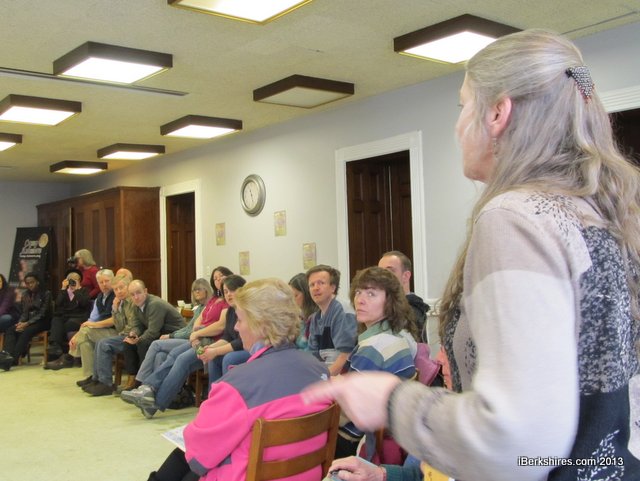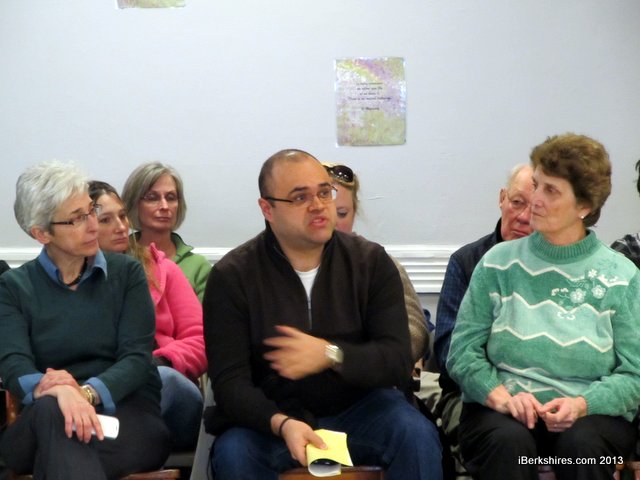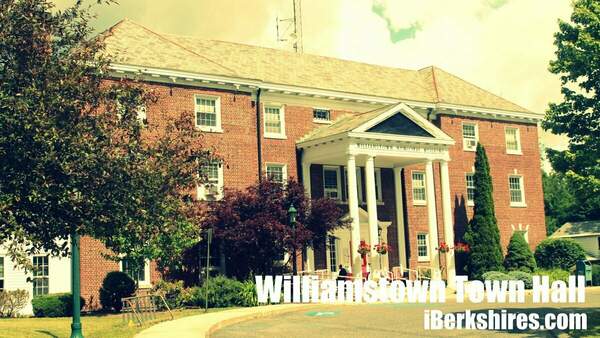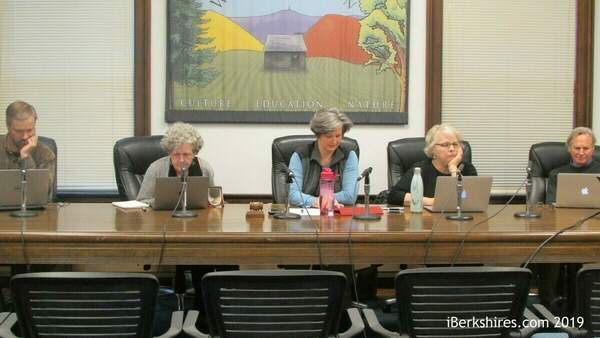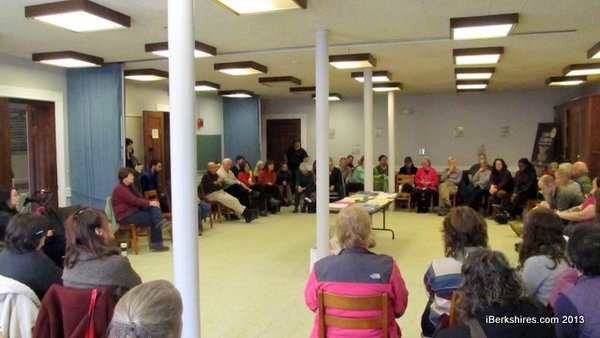
North Berkshire Coalition Seeks to Bring Attention to Transit Issues
|
Kathy Keeser tells how important BerkshireRides is to people in the hilltowns at Friday's forum. |
NORTH ADAMS, Mass. — The entire Western Massachusetts region needs to determine its transportation priorities and speak with one voice if it wants to get Boston's attention.
That was the consensus of Friday morning's monthly forum of the Northern Berkshire Community Coalition. Some 60 community members and leaders, including state Rep. Gailanne Cariddi, D-North Adams, and state Sen. Benjamin B. Downing, D-Pittsfield, joined to discuss the region's transportation challenges — and how to overcome them.
"How do we help you do your job?" coalition director Alan Bashevkin asked the Berkshire delegates. "How do we get people to see what's out here? ... It feels like we're swimming upstream here."
Cariddi said getting information to the state representatives was important because they can bring that message to the State House. "I'm on the Transportation Committee," she said. "Tell me what you want."
It's also a matter of getting regional leaders to speak "as one loud voice," said Downing. Working together is how the legislation for Massachusetts College of Liberal Arts' new science center, the Hadley Overpass reconstruction and the broadband initiative came to fruition, he said.
"The Western Mass delegation as a whole identified a priority and spoke as one loud voice on the issue," he said. Whenever state officials come out here, "they have to hear over and over a consistent message."
Getting from here to there in Berkshire County is rarely easy for those who don't have cars. The Patrick administration is pushing for a broader $1.9 billion investment in infrastructure but new bridges and roads won't mean much for residents who can't catch a bus to work.
Gary Shepard, head of the Berkshire Regional Transit Authority, has been advocating with other RTAs across the state for permanent funding that will put the regional hubs on a par with the 800-pound gorialla that's the Massachusetts Bay Transit Authority.
"We need a dedicated line item with dedicated revenue," said Shepard. "That is so important to our future."
The BRTA is "retrofunded" each year; without having a line item in the budget, it has to come back each year looking for money.
|
Juan Baena said his mother relies on public transportation and it's made her more independent. |
That lack of funding — and definitive source of revenue — is keeping the line from expanding and extending hours that are critical to residents, students, workers and businesses.
Shepard said he "was shocked" to learn that one of the No. 1 concerns for companies was how to get their employees to work. A survey by the Berkshire Chamber of Commerce last year revealed that many businesses — both service industry and manufacturing — saw more accessible transportation as a benefit.
The BRTA only operates days Mondays through Saturday on looped routes that can get to the next stop in minutes but take an hour to come back. Shepard envisions two-way routes with buses every hour and mini-buses along secondary lines feeding into main transit lines that run seven days a week and later than 5 p.m.
Shepard estimated that those changes would bump ridership by between 30 and 60 percent.
For Betty and Russell Bidwell, transport through BerkshireRides, a North County supplement to the BRTA, is a "godsend" since they had car problems. Betty works as a waitress, which makes for a constantly changing schedule that doesn't line up with the bus. BerkshireRides, she said, picks up and drops off right at her door.
"BerkshireRides has always been right there for us," said Betty.
When Juan Baena moved from Williamstown to Adams, he worried because his mother was in North Adams and he could no longer drive her where she needed to go. Enter BerkshireRides, which gets her to her job at a reasonable cost.
"She feels really empowered and independent for the first time," he said. Baena, a native of Colombia, thought the BRTA should consider reaching out to the Berkshire Immigrant Center. The growing immigrant population in the area would use the B-bus and the center could help those with language difficulties.
"It is really important to add our voice," said Baena.
|
|
Other speakers pointed to the need for transportation for the college student population in the county, for those far from the regular bus routes in the hilltowns, for wheelchairbound who don't qualify for reduced bus passes but can't afford the wheelchair vans, and for clients of service organizations like Berkshire Family and Individual Resources.
Forum attendees brainstormed some ways to bring State House attention to the issue, such as texting or tweeting when having bus around would be handy, and contacting state officials.
Telling how public transportation — or lack thereof — affects someone is the best method, said Downing, because they make the issue "more real" and get the importance of the message across.
"These stories count more than a forwarded email," he said.
Tags: BRTA, community forum, mass transit, NBCC, transportation,

